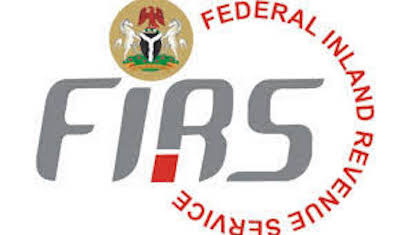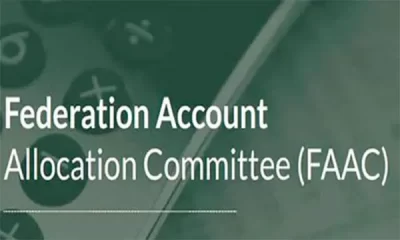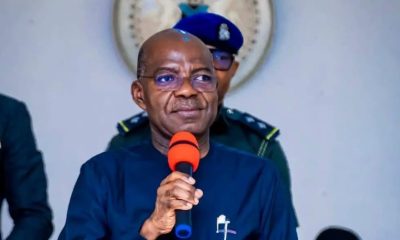Business News
States Record N300b IGR, Taxpayers Hit 20 Million

By Tony Obiechina, Abuja
The Executive Chairman of Federal Inland Revenue Service (FIRS), Mr Tunde Fowler has disclosed that the states have recorded a leap in their Internally Generated Revenue (IGR) from N800 billion in in 2016 to N1.
Fowler who made the disclosure on Thursday, also said that Nigeria’s tax database has increased from ten to twenty million, with a target of 45 million taxpayers nationwide by December, 2016.
Speaking at the North Regional launch of the New Taxpayer Identification Number (TIN) Registration System andconsolidated national tax database programme, Fowler who is also the Chairman of Joint Tax Board (JTB), noted that the new system also provides immense benefits to thetaxpayers.
A statement from FIRS in Abuja, quoted the Executive Chairman: “The consolidated database apart from providing a unique identity to the taxpayer also facilitates ease of compliance. It limits the incidence of double taxation and is a prerequisite for a number of transactions such as sale and purchase of immoveable property, registration of vehicles, applications for plot of land,import and export licence, registration as a contractor, entry visas among others. Ultimately, the system promotes the ease of doing business for both individuals and corporate bodies”.
Fowler listed the achievements of the JTB during his tenure to include:
*The expansion of the tax base from 10 million to 20 milliontaxpayers with the potential for an increase of up to 45 millionbefore the end of the third quarter of 2019; A growth in the IGR ofStates by over 46.11% from N800.02 billion in 2016 to N1.16 trillion in 2018; A growth of FIRS collections by 53.81% from N3.30 trillion in 2016 to N5.32 trillion in 2018; with the 2018 total collection of N5.32 trillion being the highest collection ever in the history of theFIRS, while Non-Oil Revenue, with a collection of N2.85 trillionaccounted for 53.63% of total revenue collection;
*Payment by the Federal Government of the total sum of N135.8 billion representing all outstanding PAYE tax liabilities owed by Federal MDAs to States from 2002 to 2016; with a total of N31.08 billion paid to the States in the North-Central Geopolitical Zone. We are confident that this gesture by the Federal Government will encourage State Governments to also reciprocate and promptly remit all Withholding Taxes and VAT due to the Federation Account;#. A positive movement during the same period by Nigeria up 25 points in the Tax Administration Section of World Bank ‘Ease of Doing Business’. This positive progression is also reinforced by the recent listing of Nigeria as one of the ‘top 20 improvers in Doing Business for the year 2020’ by the World Bank. We expect that more positive country reports will be released by the time the full report by the World Bank is released in October 24th, 2019.
“The TIN Registration Go-Live event which has brought together all Tax Authorities with a common vision and goal, is poised to change the financial profile of Nigeria and particularly, lay a strong financial foundation to fund government at all tiers beyond aid, grants and borrowing”, he said.
Fowler commended the strides of the Kwara IRS under Dr Murtala Awodun.
Said he: “The choice of Kwara State as the host for theNorth-Central Regional flag-off event is strategic as it is inrecognition of the path-finding role it has played in the questtowards ensuring sustainable internally generated revenue profile for the State as well as for the region.
“Over the years, the Kwara State Internal Revenue Service (KWIRS) has designed and executed far reaching IGR reforms that have seen it establish itself as a model Revenue Agency in the region. Following the signing of the Law granting it autonomy in June 2015, it has developed in leaps and bounds constantly seeking to achieve excellence in tax administration.
“Having achieved a 221% increase in its collection, from N7.1 billionin 2015 at the time of attaining its autonomous status, to N23 billionin 2018, Kwara State IRS has come to be a benchmark for revenueauthorities, not just within the North Central region, but nationwide as well. It is also worthy of note that KWIRS is also the only State Revenue Agency in the country to have been ISO certified, with the ISO9001 for Quality Management System and ISO/IEC 22301 for Business Continuity Management System.
“While Kwara State IRS continue to set standards, sister RevenueAuthorities within the zone are not left behind as statistics indicatethat Niger State with 60.05% and Nasarawa State with 22.56% are among the top fifteen States with an annual growth rate above 20% in 2018.
This is coupled with the fact that the FCT IRS, in its first full yearof autonomous operations is comfortably placed as the fourth highest sub-national revenue generating agency in 2018, behind Lagos, Rivers and Ogun States.Fowler noted that the JTB under him is not doing badly at the level of promoting the nation’s business and financial health: Said the FIRSChairman: Äs the process of securing the relevant data from theCentral Bank of Nigeria (CBN) via the Nigeria Inter-Bank SettlementSystem (NIBBS), and the National Identity Management Commission (NIMC) as directed by the President are ongoing, we believe that today’s ceremony will further reinforce the need for us to work together as one towards ensuring a more friendly tax environment in the country, while promoting the various socio-economic initiatives of Mr.President such as the Strategic Revenue Growth Initiative, Ease of Doing Business and the Economic and Recovery Growth Plan.
“The New TIN Registration System is geared towards reinforcing thelaudable efforts of this administration towards building a robust tax-revenue administration system for the country and it aims to improve the ease of tax compliance while ensuring a sustainable andinclusive economy for all Nigerians.
“Over the last four years, the economic policies of the currentadministration has focused on establishing a stable foundation for further socio-economic growth and development, and with the astute leadership of Mr. President, the milestones achieved bears ample testimony on the impact that has been made, not only in tax-revenue administration, but in the environment of doing business in Nigeria.
Governor of Kwara State, Mallam AbdulRahman AbdulRasak who was represented by the Deputy Governor, Kayode Alabi also lauded the TIN initiative, saying that the payment of tax is change that everyone must embrace.
“Tax payment is integral to the growth and development of everyeconomy and it must be embraced by every human who wants to see the change we all desire. We are very optimistic that this launch of TIN Registration System and consolidated National Database will indeed increase the coverage of taxpayers and simplify tax processes in the North-Central Geopolitical Region”, he said
“When the new TIN tax database was launched by the Vice President in Abuja by Professor Yemi Osinbajo, two months ago, he noted that tax-revenue administration in the 21st century has evolved into “a systematic and deliberate process that is underpinned by the availability of accurate and reliable data. It entails deliberate and strategic planning initiatives, well informed and adequately equippedtax-revenue managers who drive the process both on and off the field”.
Business News
Tinubu Congratulates Dangote on World Bank Appointment

By Jennifer Enuma, Abuja
President Bola Tinubu has congratulated Alhaji Aliko Dangote, the President of Dangote Group, on his appointment to the World Bank’s Private Sector Investment Lab, a body tasked with promoting investment and job creation in emerging economies.
In a statement by Special Adviser on Media and Publicity, Bayo Onanauga, the President described the appointment as apt, given Dangote’s rich private sector experience, strategic investments, and many employment opportunities created through his Dangote Group.
The Dangote Group became one of Africa’s leading conglomerates through innovation and continuous investment.
Dangote Group’s business interests span cement, fertiliser, salt, sugar, oil, and gas. However, the $20 billion Dangote Petroleum Refinery and Petrochemicals remains Africa’s most daring project and most significant single private investment.
“President Tinubu urges Dangote to bring to bear on the World Bank appointment his transformative ideas and initiatives to impact the emerging markets across the world fully” the statement said.

The World Bank announced Dangote’s appointment on Wednesday, as part of a broader expansion of its Private Sector Investment Lab. The lab now enters a new phase aimed at scaling up solutions to attract private capital and create jobs in the developing world.
The CEO of Bayer AG, Bill Anderson, the Chair of Bharti Enterprises, Sunil Bharti Mittal, and the President and CEO of Hyatt Hotels Corporation, Mark Hoplamazian, are on the Private Sector Investment Lab with Dangote.
The World Bank said the expanded membership brings together business leaders with proven track records in generating employment in developing economies, supporting the Bank’s focus on job creation as a central pillar of global development.
Business Analysis
Nigeria Customs Generates over N1.75trn Revenue in 2025
By Joel Oladele, Abuja
The Nigeria Customs Service (NSC) has generated an impressive N1,751,502,252,298.05 in revenue during the first quarter of 2025.
The Comptroller-General (CG) of the Service, Bashir Adeniyi, disclosed this yesterday, during a press briefing in Abuja.
According to Adeniyi, the achievement not only surpasses the quarterly target but also marks a substantial increase compared to the same period last year, reflecting the effectiveness of recent reforms and the dedication of customs officers across the nation.
“This first quarter of 2025 has seen our officers working tirelessly at borders and ports across the nation.
I’m proud to report we’ve made real progress on multiple fronts—from increasing revenue collections to intercepting dangerous shipments,” Adeniyi stated.He attributed this success to the reforms initiated under President Bola Tinubu’s administration and the guidance of the Honourable Minister of Finance and Coordinating Minister of the Economy, Olawale Edun.
The CG noted that the revenue collection for Q1 2025 exceeded the quarterly benchmark of N1,645,000,000,000.00 by N106.5 billion, achieving 106.47% of the target. This performance represents a remarkable 29.96% increase compared to the N1,347,705,251,658.31 collected in Q1 2024.
Adeniyi highlighted the month-by-month growth, noting that January’s collection of N647,880,245,243.67 surpassed its target by 18.12%, while February and March also showed positive trends.
“I’m pleased to report the Service’s revenue collection for Q1 2025 totaled N1,751,502,252,298.05.
“Against our annual target of N6,580,000,000,000.00, the first quarter’s proportional benchmark stood at N1,645,000,000,000.00. I’m proud to announce we’ve exceeded this target by N106.5 billion, achieving 106.47% of our quarterly projection. This outstanding performance represents a substantial 29.96% increase compared to the same period in 2024, where we collected N1,347,705,251,658.31.
“Our month-by-month analysis reveals even more encouraging details of this growth trajectory,” Adeniyi said.
In addition to revenue collection, Adeniyi said the NCS maintained robust anti-smuggling operations, recording 298 seizures with a total Duty Paid Value (DPV) of ₦7,698,557,347.67.
He stated that rice was the most seized commodity, with 135,474 bags intercepted, followed by petroleum products and narcotics.
“From rice to wildlife, these seizures show our targeted approach,” Adeniyi remarked, noting the NCS’s commitment to combating smuggling and protecting national revenue.
Adeniyi also highlighted key initiatives, including the expansion of the B’Odogwu customs clearance platform and the launch of the Authorized Economic Operators Programme, which aims to streamline processes for compliant businesses. The NCS’s Corporate Social Responsibility Programme, “Customs Cares,” was also launched, focusing on education, health, and environmental sustainability.
Despite these achievements, the CG noted that the NCS faced challenges, including exchange rate volatility and non-compliance issues. Adeniyi acknowledged the need for ongoing adaptation and collaboration with stakeholders to address these challenges effectively.
Looking ahead, the NCS aims to continue its modernization efforts and enhance service delivery, ensuring that it remains a critical institution in Nigeria’s economic and security landscape.
“Results speak louder than plans; faster clearances through B’Odogwu, trusted traders in the AEO program, and measurable food price relief from our exemptions. We’ll keep scaling what works,” he concluded.
BUSINESS
NSIA Net Assets Hit N4.35trn in 2024
By Tony Obiechina Abuja
The Nigeria Sovereign Investment Authority (NSIA) yesterday disclosed that its net assets grew from N156bn in 2013 to N4.35 trillion in 2024.
Similarly, the Authority has remained profitable for 12 consecutive years, leading to cumulative retained earnings of N3.
74 trillion in 2024.Managing Director and Chief Executive Officer of NSIA, Aminu Umar- Sadiq made these disclosures at a media engagement in Abuja, highlighting its audited financial results for the 2024 fiscal year.
According to him, the results underscored the resilience of the authority’s investment strategy and the strength of its earnings, driven by a well-diversified revenue base and robust risk management practices, despite a challenging global macroeconomic and geopolitical environment.
Total operating profits, excluding share of profits from associates and Joint Venture (JV) entities, increased from N1.17 trillion in 2023 to N1.86 trillion in 2024, driven by the strong performance of
NSIA’s diversified investment portfolio, infrastructure assets, gains from foreign exchange movements, and derivative valuations.
In addition, Total Comprehensive Income (TCI), inclusive of share of profits from associates and JV entities, reached N1.89 trillion in 2024, reflecting a 59 per cent increase from N1.18 trillion in 2023.
Core TCI (excluding foreign exchange and derivative valuation gains) rose by 148 per cent to N407.9 billion in 2024 compared to N164.7 billion in 2023, supported by robust returns on financial assets measured at fair value through profit and loss, including collateralised securities, private equity, hedge funds, and Exchange-Traded Funds (ETFs).
Umar-Sadiq said the authority’s outstanding financial performance in 2024 reflected the “strength of our strategic vision, disciplined execution and unwavering commitment to sustainable socio-economic advancement.”
He said, “By leveraging innovation, strategic partnerships and sound risk management, we have not only delivered strong returns but also created value for our stakeholders
“As we move forward, we remain focused on driving economic transformation, expanding opportunities, scaling transformative impact and ensuring long-term prosperity for current and future generations of Nigerians.”
The CEO reaffirmed the authority’s commitment to managing the country’s SWF, and delivering the mandates enshrined in the NSIA Act.
He said NSIA remained poised to continually create long-term value for its stakeholders by delivering excellent risk-adjusted financial results, developing a healthy and well-diversified portfolio of assets and large-scale infrastructure projects, and enhancing the desired social outcomes.
He noted that NSIA was committed to its mandate of prudent management and investment of Nigeria’s sovereign wealth.
“In adherence to its Establishment Act, NSIA prioritises transparency, disclosure, and effective communication with all stakeholders and counterparties,” he said.
He pointed out that in the year under review, a new board, led by Olusegun Ogunsanya as Chairman, was appointed by President Bola Tinubu, in accordance with the provisions of the NSIA Act.
The new board will provide strategic direction and oversight, in addition to playing a pivotal role in critical decision making.
He remarked that under the guidance of the Board, the Authority will retain focus on its primary mandate of creating shared value for all stakeholders based on its continued adoption of corporate governance practices.
“NSIA prides itself an investment institution of the federation established to manage funds in excess of budgeted oil revenues and its mission is to play a pivotal role in driving sustained economic development for the benefit of all Nigerians through building a savings base for the Nigerian people, enhancing the development of the county’s infrastructure, and providing stabilisation support in times of economic misadventure,” he added.

































